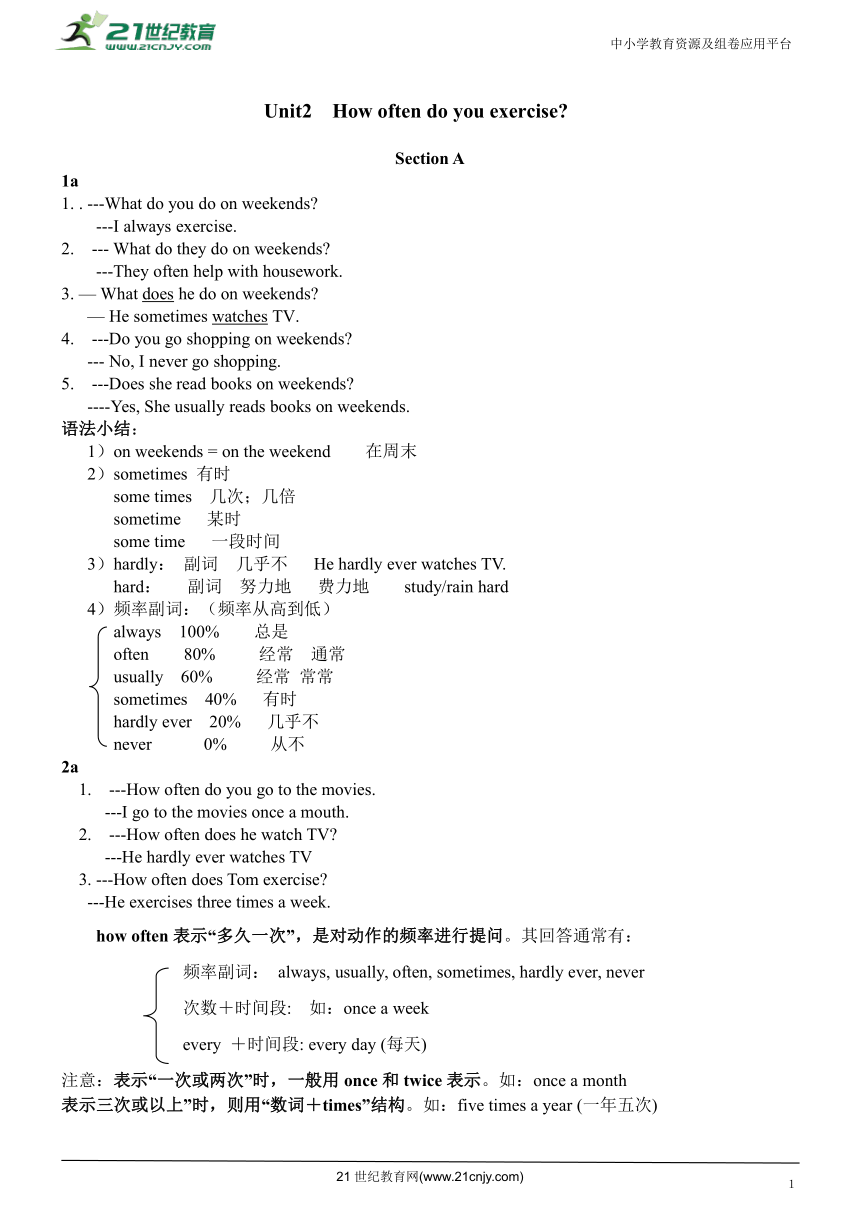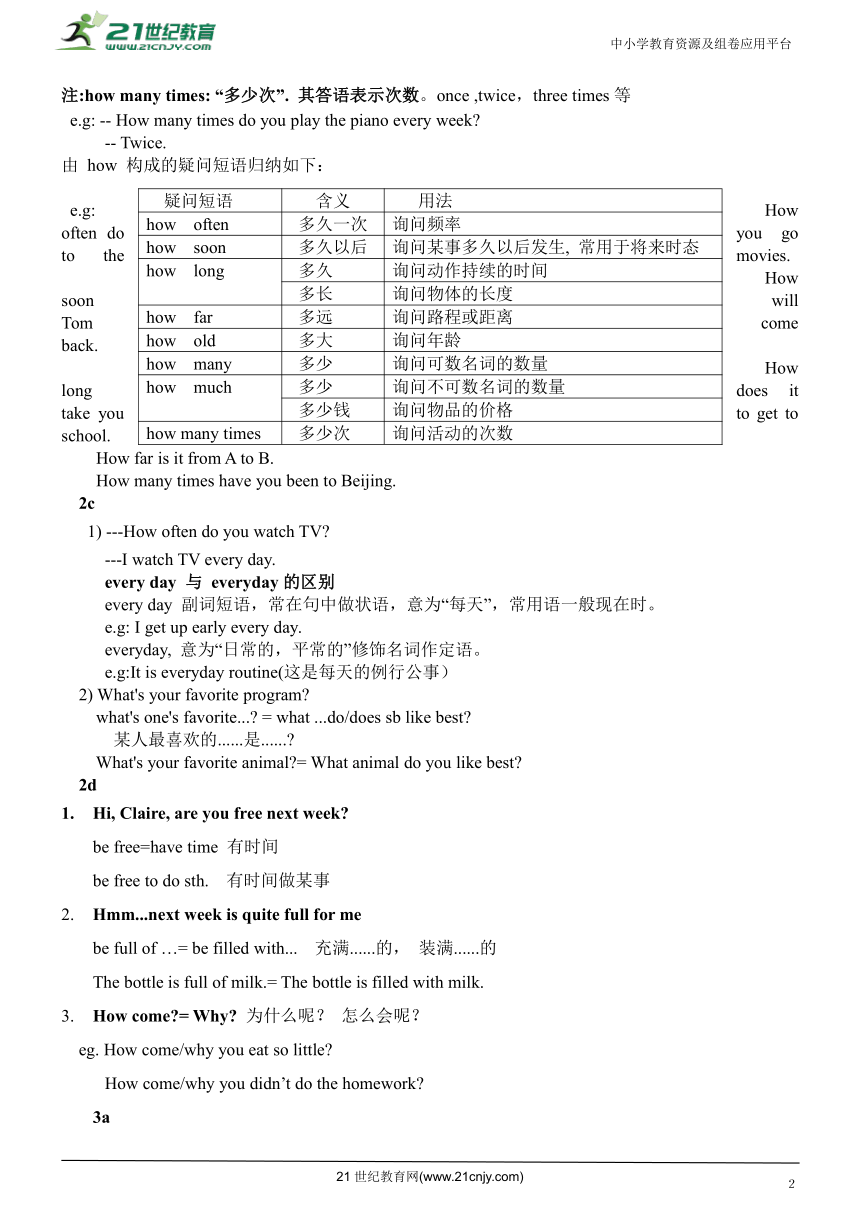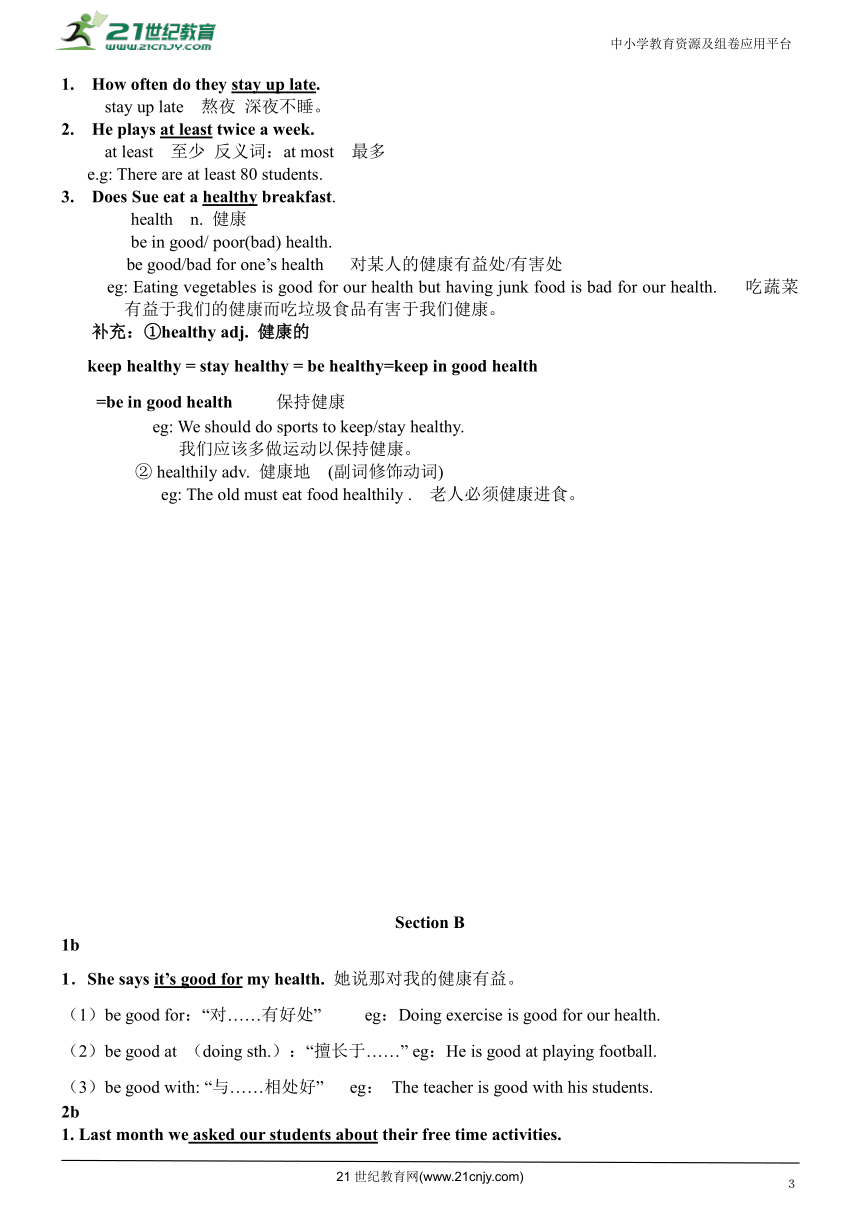Unit2 How often do you exercise知识点总结归纳【人教版八年级上册】
文档属性
| 名称 | Unit2 How often do you exercise知识点总结归纳【人教版八年级上册】 |  | |
| 格式 | docx | ||
| 文件大小 | 66.0KB | ||
| 资源类型 | 试卷 | ||
| 版本资源 | 人教新目标(Go for it)版 | ||
| 科目 | 英语 | ||
| 更新时间 | 2024-04-16 14:56:54 | ||
图片预览



文档简介
中小学教育资源及组卷应用平台
Unit2 How often do you exercise
Section A
1a
1. . ---What do you do on weekends
---I always exercise.
2. --- What do they do on weekends
---They often help with housework.
3. — What does he do on weekends
— He sometimes watches TV.
4. ---Do you go shopping on weekends
--- No, I never go shopping.
5. ---Does she read books on weekends
----Yes, She usually reads books on weekends.
语法小结:
1)on weekends = on the weekend 在周末
2)sometimes 有时
some times 几次;几倍
sometime 某时
some time 一段时间
3)hardly: 副词 几乎不 He hardly ever watches TV.
hard: 副词 努力地 费力地 study/rain hard
4)频率副词:(频率从高到低)
always 100% 总是
often 80% 经常 通常
usually 60% 经常 常常
sometimes 40% 有时
hardly ever 20% 几乎不
never 0% 从不
2a
1. ---How often do you go to the movies.
---I go to the movies once a mouth.
2. ---How often does he watch TV
---He hardly ever watches TV
3. ---How often does Tom exercise
---He exercises three times a week.
how often表示“多久一次”,是对动作的频率进行提问。其回答通常有:
频率副词: always, usually, often, sometimes, hardly ever, never
次数+时间段: 如:once a week
every +时间段: every day (每天)
注意:表示“一次或两次”时,一般用once和twice表示。如:once a month
表示三次或以上”时,则用“数词+times”结构。如:five times a year (一年五次)
注:how many times: “多少次”. 其答语表示次数。once ,twice,three times等
e.g: -- How many times do you play the piano every week
-- Twice.
由 how 构成的疑问短语归纳如下:
疑问短语 含义 用法
how often 多久一次 询问频率
how soon 多久以后 询问某事多久以后发生, 常用于将来时态
how long 多久 询问动作持续的时间
多长 询问物体的长度
how far 多远 询问路程或距离
how old 多大 询问年龄
how many 多少 询问可数名词的数量
how much 多少 询问不可数名词的数量
多少钱 询问物品的价格
how many times 多少次 询问活动的次数
e.g: How often do you go to the movies.
How soon will Tom come back.
How long does it take you to get to school.
How far is it from A to B.
How many times have you been to Beijing.
2c
1) ---How often do you watch TV
---I watch TV every day.
every day 与 everyday的区别
every day 副词短语,常在句中做状语,意为“每天”,常用语一般现在时。
e.g: I get up early every day.
everyday, 意为“日常的,平常的”修饰名词作定语。
e.g:It is everyday routine(这是每天的例行公事)
2) What's your favorite program
what's one's favorite... = what ...do/does sb like best
某人最喜欢的......是......
What's your favorite animal = What animal do you like best
2d
Hi, Claire, are you free next week
be free=have time 有时间
be free to do sth. 有时间做某事
Hmm...next week is quite full for me
be full of …= be filled with... 充满......的, 装满......的
The bottle is full of milk.= The bottle is filled with milk.
How come = Why 为什么呢? 怎么会呢?
eg. How come/why you eat so little
How come/why you didn’t do the homework
3a
1. How often do they stay up late.
stay up late 熬夜 深夜不睡。
2. He plays at least twice a week.
at least 至少 反义词:at most 最多
e.g: There are at least 80 students.
3. Does Sue eat a healthy breakfast.
health n. 健康
be in good/ poor(bad) health.
be good/bad for one’s health 对某人的健康有益处/有害处
eg: Eating vegetables is good for our health but having junk food is bad for our health. 吃蔬菜有益于我们的健康而吃垃圾食品有害于我们健康。
补充:①healthy adj. 健康的
keep healthy = stay healthy = be healthy=keep in good health
=be in good health 保持健康
eg: We should do sports to keep/stay healthy.
我们应该多做运动以保持健康。
② healthily adv. 健康地 (副词修饰动词)
eg: The old must eat food healthily . 老人必须健康进食。
Section B
1b
1.She says it’s good for my health. 她说那对我的健康有益。
(1)be good for:“对……有好处” eg:Doing exercise is good for our health.
(2)be good at (doing sth.):“擅长于……” eg:He is good at playing football.
(3)be good with: “与……相处好” eg: The teacher is good with his students.
2b
1. Last month we asked our students about their free time activities.
ask sb. to do : 要求…做某事 Teacher asked me to clean the classroom.
ask sb. not to do sth.: 叫…不要做某事
ask sb about sth. 询问某人某事
ask sb. for sth. : 向某人要求… 如:ask teacher for help
2. Here are the results.
① here 放于句首时,句子用部分倒装(主谓倒装)
eg. Here comes the bus.
Here is your pen.
②.result: n 结果 后果。
the result(s) of ......的结果。
eg. We are waiting for the result of the match.
3. We found that only fifteen percent of our students exercise every day.
①percent n. 百分之…percent 无复数形式。
结构:基数词+percent+of+名词
注:作主语时,谓语动词用单复数取决于of后面的名词。
e.g: Forty percent of the students in our class are girls.
①.Thirty percent of the students __like_______ (like) watching TV.
②. 70 percent of water __is_____ ( be ) salty water(盐水)。
And twenty percent do not exercise at all.
Not...at all ① 一点儿也不
eg: He didn’t do his homework at all yesterday.
He is not worried at all.
②没有什么 不客气
Thank you very much. Not at all
You’re welcome come.
That’s OK/ that’s all right.
But we were surprised that ninety percent of them use the Internet every day.
surprise (n) 惊讶: to one’s surprise 令某人惊讶的是
(v) 使惊奇、意外: be surprised at sth. 对… 感到意外
be surprised to do sth. 惊讶做某事
be surprised that + 从句
eg:I was surprised at the news = I was surprised to hear the news.
6. Although many students like to watch sports, game shows are the most popular.
although(conj):“尽管;虽然”,表示转折关系,同义词有though, 不能与but 同时使用。
e.g: Although they’re neighbors, they don’t play together.
= They’re neighbors, but they don’t play together.
尽管他们是邻居,但是他们不在一起玩。
3a
She says she is afraid!
be afraid to do sth. 害怕做某事
I’m afraid to go out at night.
be afraid of doing sth
sb//sth
g: I’m afraid of snakes.
Jane was afraid of asking question.
作文
How to Keep Healthy
Everyone wants to be healthy. Firstly, I think a good eating habit is very important. We should eat lots of vegetables and fruit. We shouldn’t eat too much junk food. Drinking milk is also good for health. Secondly, we should have enough sleep. Usually we need at least eight hours’ sleep every night. Thirdly, we need to exercise, such as walking, running and playing ball games. Exercise is good for the mind and the body. Of course there are many other ways to keep healthy. But I think having good habits is the most important.
调查报告
【话题分析】
本单元的话题是“课余活动”,围绕这一话题谈论从事某一活动的频率。在写作方面,要求写一篇有关日常活动的调查报告。写作时,开篇点题,即点出调查报告的主题和对象;其次,要对调查报告的内容展开分述,要正确使用频度副词及次数的表达;结尾要进行综述以表达中心观点。
【写作实例】
根据下面八年级十三班学生的活动调查表,用英语写一篇调查报告。
Class 13, Grade 8: Activity survey
Activity Every Day Once or twice a Week Three or four times a Week
Watch TV 90% 10% 0%
Use the Internet 80% 0% 20%
Play sports 30% 20% 50%
【思路点拨】
“总分总法”写关于调查报告类的作文
步骤 构思 列纲
1 总:整体介绍所要进行的调查 Here are the results…
2 分:逐条介绍相应内容 …watch TV…, use the Internet…,…play sports…
3 总:总结并整体评价或表达观点 It is good to relax by…but I think… it is good for…
【经典范文】
Class 8, Grade 8: Activity survey
Here are the results of the student activity survey in class13, grade 8.
Ninety percent of the students watch TV every day. Only ten percent of them watch TV once or twice a week. None of them watch TV three or four times a week at all. As for using the Internet, eighty percent of the students use the Internet every day. The other twenty percent of the students use it three or four times a week. Most students use it for fun and not for homework. The results about playing sports are also interesting. Thirty percent of the students play sports every day. Twenty percent of the students do is once or twice a week. Fifty percent of the students do it three or four times a week.
It’s good to relax by using the Internet or watching TV, but I think playing sports is the best way to relax. It’s good for our health.
21世纪教育网(www.21cnjy.com)
Unit2 How often do you exercise
Section A
1a
1. . ---What do you do on weekends
---I always exercise.
2. --- What do they do on weekends
---They often help with housework.
3. — What does he do on weekends
— He sometimes watches TV.
4. ---Do you go shopping on weekends
--- No, I never go shopping.
5. ---Does she read books on weekends
----Yes, She usually reads books on weekends.
语法小结:
1)on weekends = on the weekend 在周末
2)sometimes 有时
some times 几次;几倍
sometime 某时
some time 一段时间
3)hardly: 副词 几乎不 He hardly ever watches TV.
hard: 副词 努力地 费力地 study/rain hard
4)频率副词:(频率从高到低)
always 100% 总是
often 80% 经常 通常
usually 60% 经常 常常
sometimes 40% 有时
hardly ever 20% 几乎不
never 0% 从不
2a
1. ---How often do you go to the movies.
---I go to the movies once a mouth.
2. ---How often does he watch TV
---He hardly ever watches TV
3. ---How often does Tom exercise
---He exercises three times a week.
how often表示“多久一次”,是对动作的频率进行提问。其回答通常有:
频率副词: always, usually, often, sometimes, hardly ever, never
次数+时间段: 如:once a week
every +时间段: every day (每天)
注意:表示“一次或两次”时,一般用once和twice表示。如:once a month
表示三次或以上”时,则用“数词+times”结构。如:five times a year (一年五次)
注:how many times: “多少次”. 其答语表示次数。once ,twice,three times等
e.g: -- How many times do you play the piano every week
-- Twice.
由 how 构成的疑问短语归纳如下:
疑问短语 含义 用法
how often 多久一次 询问频率
how soon 多久以后 询问某事多久以后发生, 常用于将来时态
how long 多久 询问动作持续的时间
多长 询问物体的长度
how far 多远 询问路程或距离
how old 多大 询问年龄
how many 多少 询问可数名词的数量
how much 多少 询问不可数名词的数量
多少钱 询问物品的价格
how many times 多少次 询问活动的次数
e.g: How often do you go to the movies.
How soon will Tom come back.
How long does it take you to get to school.
How far is it from A to B.
How many times have you been to Beijing.
2c
1) ---How often do you watch TV
---I watch TV every day.
every day 与 everyday的区别
every day 副词短语,常在句中做状语,意为“每天”,常用语一般现在时。
e.g: I get up early every day.
everyday, 意为“日常的,平常的”修饰名词作定语。
e.g:It is everyday routine(这是每天的例行公事)
2) What's your favorite program
what's one's favorite... = what ...do/does sb like best
某人最喜欢的......是......
What's your favorite animal = What animal do you like best
2d
Hi, Claire, are you free next week
be free=have time 有时间
be free to do sth. 有时间做某事
Hmm...next week is quite full for me
be full of …= be filled with... 充满......的, 装满......的
The bottle is full of milk.= The bottle is filled with milk.
How come = Why 为什么呢? 怎么会呢?
eg. How come/why you eat so little
How come/why you didn’t do the homework
3a
1. How often do they stay up late.
stay up late 熬夜 深夜不睡。
2. He plays at least twice a week.
at least 至少 反义词:at most 最多
e.g: There are at least 80 students.
3. Does Sue eat a healthy breakfast.
health n. 健康
be in good/ poor(bad) health.
be good/bad for one’s health 对某人的健康有益处/有害处
eg: Eating vegetables is good for our health but having junk food is bad for our health. 吃蔬菜有益于我们的健康而吃垃圾食品有害于我们健康。
补充:①healthy adj. 健康的
keep healthy = stay healthy = be healthy=keep in good health
=be in good health 保持健康
eg: We should do sports to keep/stay healthy.
我们应该多做运动以保持健康。
② healthily adv. 健康地 (副词修饰动词)
eg: The old must eat food healthily . 老人必须健康进食。
Section B
1b
1.She says it’s good for my health. 她说那对我的健康有益。
(1)be good for:“对……有好处” eg:Doing exercise is good for our health.
(2)be good at (doing sth.):“擅长于……” eg:He is good at playing football.
(3)be good with: “与……相处好” eg: The teacher is good with his students.
2b
1. Last month we asked our students about their free time activities.
ask sb. to do : 要求…做某事 Teacher asked me to clean the classroom.
ask sb. not to do sth.: 叫…不要做某事
ask sb about sth. 询问某人某事
ask sb. for sth. : 向某人要求… 如:ask teacher for help
2. Here are the results.
① here 放于句首时,句子用部分倒装(主谓倒装)
eg. Here comes the bus.
Here is your pen.
②.result: n 结果 后果。
the result(s) of ......的结果。
eg. We are waiting for the result of the match.
3. We found that only fifteen percent of our students exercise every day.
①percent n. 百分之…percent 无复数形式。
结构:基数词+percent+of+名词
注:作主语时,谓语动词用单复数取决于of后面的名词。
e.g: Forty percent of the students in our class are girls.
①.Thirty percent of the students __like_______ (like) watching TV.
②. 70 percent of water __is_____ ( be ) salty water(盐水)。
And twenty percent do not exercise at all.
Not...at all ① 一点儿也不
eg: He didn’t do his homework at all yesterday.
He is not worried at all.
②没有什么 不客气
Thank you very much. Not at all
You’re welcome come.
That’s OK/ that’s all right.
But we were surprised that ninety percent of them use the Internet every day.
surprise (n) 惊讶: to one’s surprise 令某人惊讶的是
(v) 使惊奇、意外: be surprised at sth. 对… 感到意外
be surprised to do sth. 惊讶做某事
be surprised that + 从句
eg:I was surprised at the news = I was surprised to hear the news.
6. Although many students like to watch sports, game shows are the most popular.
although(conj):“尽管;虽然”,表示转折关系,同义词有though, 不能与but 同时使用。
e.g: Although they’re neighbors, they don’t play together.
= They’re neighbors, but they don’t play together.
尽管他们是邻居,但是他们不在一起玩。
3a
She says she is afraid!
be afraid to do sth. 害怕做某事
I’m afraid to go out at night.
be afraid of doing sth
sb//sth
g: I’m afraid of snakes.
Jane was afraid of asking question.
作文
How to Keep Healthy
Everyone wants to be healthy. Firstly, I think a good eating habit is very important. We should eat lots of vegetables and fruit. We shouldn’t eat too much junk food. Drinking milk is also good for health. Secondly, we should have enough sleep. Usually we need at least eight hours’ sleep every night. Thirdly, we need to exercise, such as walking, running and playing ball games. Exercise is good for the mind and the body. Of course there are many other ways to keep healthy. But I think having good habits is the most important.
调查报告
【话题分析】
本单元的话题是“课余活动”,围绕这一话题谈论从事某一活动的频率。在写作方面,要求写一篇有关日常活动的调查报告。写作时,开篇点题,即点出调查报告的主题和对象;其次,要对调查报告的内容展开分述,要正确使用频度副词及次数的表达;结尾要进行综述以表达中心观点。
【写作实例】
根据下面八年级十三班学生的活动调查表,用英语写一篇调查报告。
Class 13, Grade 8: Activity survey
Activity Every Day Once or twice a Week Three or four times a Week
Watch TV 90% 10% 0%
Use the Internet 80% 0% 20%
Play sports 30% 20% 50%
【思路点拨】
“总分总法”写关于调查报告类的作文
步骤 构思 列纲
1 总:整体介绍所要进行的调查 Here are the results…
2 分:逐条介绍相应内容 …watch TV…, use the Internet…,…play sports…
3 总:总结并整体评价或表达观点 It is good to relax by…but I think… it is good for…
【经典范文】
Class 8, Grade 8: Activity survey
Here are the results of the student activity survey in class13, grade 8.
Ninety percent of the students watch TV every day. Only ten percent of them watch TV once or twice a week. None of them watch TV three or four times a week at all. As for using the Internet, eighty percent of the students use the Internet every day. The other twenty percent of the students use it three or four times a week. Most students use it for fun and not for homework. The results about playing sports are also interesting. Thirty percent of the students play sports every day. Twenty percent of the students do is once or twice a week. Fifty percent of the students do it three or four times a week.
It’s good to relax by using the Internet or watching TV, but I think playing sports is the best way to relax. It’s good for our health.
21世纪教育网(www.21cnjy.com)
同课章节目录
- Unit 1 Where did you go on vacation?
- Section A
- Section B
- Unit 2 How often do you exercise?
- Section A
- Section B
- Unit 3 I'm more outgoing than my sister.
- Section A
- Section B
- Unit 4 What's the best movie theater?
- Section A
- Section B
- Unit 5 Do you want to watch a game show?
- Section A
- Section B
- Unit 6 I'm going to study computer science.
- Section A
- Section B
- Unit 7 Will people have robots?
- Section A
- Section B
- Unit 8 How do you make a banana milk shake?
- Section A
- Section B
- Unit 9 Can you come to my party?
- Section A
- Section B
- Unit 10 If you go to the party, you'll have a grea
- Section A
- Section B
